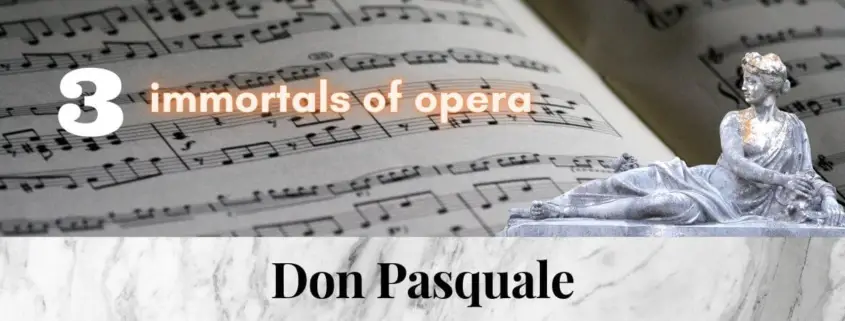3 immortal pieces from Donizetti’s DON PASQUALE – the best interpretations in YouTube
Don Pasquale is one of the three great buffo operas of the bel canto period. Despite health difficulties, Donizetti created in this late work an opera with many great musical ideas.
Norina’s famous aria “Quel guardo di cavaliere”
The fact that Norina is reading a love story is a contemporary sideswipe by Donizetti, as such “dime novels” were immensely popular at the time. In terms of music history, this piece is interesting. We know that Chopin admired Donizetti and he tried to imitate Donizetti’s singing voice bel canto on the piano. The first part of the well-known aria begins as if in a Chopin Nocturne. Over a swaying 6/8 accompaniment, Norina sings a singing cantilena with soulful ritardandi. The familiar theme that follows is accompanied by a dotted rhythm. After a third section, the dotted melody returns leading first to a B flat and then in the “vivasi ah” to a high C, the aria then ends with a 7 bar trill. A wonderful aria for a virtuoso coloratura soprano.
We hear this aria as interpreted by Anna Netrebko. Her Norina at the MET in New York was a great event. She was able to fully display her comedic and vocal abilities. As in Donizetti’s other buffo masterpiece, “Elisir d’amore,” she succeeded in thrilling the audience with her charisma and stage presence.
Quel guardo di cavaliere … son anch’io la virtu – Netrebko
Ernesto is deadly unhappy – the aria with the trumpet solo
Listening to the music of Don Pasquale, one is amazed at how far this music is from Wagner. With “Cerchero lontana terra” we hear a classical number of Italian opera, namely that of a young man with lovesickness. On the other hand, Wagner writes the premiere of the Flying Dutchman at the same time as Donizetti’s work and already 2 years later the German was to compose Tannhäuser and found the musical drama. Donizetti’s heroes are taken from life and are far removed from Wagner’s world of legends.
Donizetti presents us with something unusual in this aria. A deeply sad trumpet solo takes us into the mood of Ernesto. Normally, the listener does not associate this instrument with these feelings. Donizetti probably deliberately provoked this effect to emphasize the complexity, which is meant to be more than a mere comedy of errors.
Florez presents us a vulnerable but yet not a sentimental Ernesto. The recitative of the first part is magnificently interpreted and makes one feel the despair (“Povero Ernesto”) of the abandoned and betrayed one. and at the end of the long aria he shows a flawless and effortless high C.
Povero Ernesto … Cerchero lontana terra – Florez
The famous Sillabato duet of the buffo basses
This duet has become famous for its rapid speech singing (sillabato) and is one of the absolute highlights of this opera (from 5.00 in the following recording).
Cheti cheti immantinente … Vedrai se giovino – Smith / Evans







Leave a Reply
Want to join the discussion?Feel free to contribute!